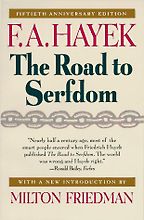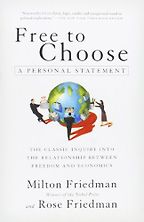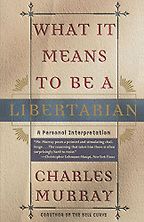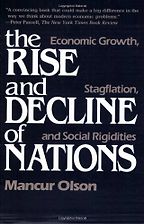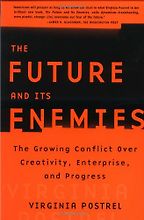Two of the books you’ve chosen are about freedom and two are about social dynamism. Hayek’s Road to Serfdom, I would say, is about both. It’s also the first of these books to be published, in 1944. Do you want to start with that one?
Hayek, when I thumb back through it and look at what I marked when I first read it, was the book that, to me, convincingly demonstrated what was already intuitive: namely, the utter futility, the illusion of government planning as a mechanism for uplifting those less fortunate. I read it together with dozens of other books, but the way he dissected and depicted the inexorable tendencies in statism to self-perpetuation of bureaucracies, matched what I thought was the evidence I saw around me.
What stage were you in life when you first encountered The Road to Serfdom?
Well, post-college. In my mid 20s, probably.
Did you recall it having a fairly profound effect on you at the time?
I think it did. That could be said of one or two of these others as well, especially the Friedman: something that clarifies and confirms an intuition or a tentative empirical judgment you’ve come to. At the time, in the 1970s, it wasn’t hard to look at the wreckage, and say, ‘This isn’t working – and the more government tries to do, the more bureaucracies it piles up, the more regulations it writes, the less well off people at large seem to be…’
You’re a sitting governor [of Indiana], you’ve been an OMB [US Office of Management and Budget] director and you deal day to day with people who want to plan stuff – everything from zoning commissions to the legislature. How does this book inflect how you deal with that?
With humility and caution. I think I would say that this is something you’ll see in the Postrel book as well, probably in several of these books. They led me to a view that government clearly has to establish rails around certain behaviour and economic activity. But simplicity, clarity of the rules, a caution about over-prescriptiveness in how to achieve a certain outcome or prevent a certain externality from happening – I think I probably first saw a lot of that in Hayek.
For instance, I remember my first day on this job. We did a ton of things, we wanted to emphasise that a lot of change was afoot. But I went over to see our biggest regulatory agency – we had hundreds of people in the room or on the phone. It was an environmental management agency and I told them then, and I’ve told them since, that we did not intend to weaken or moderate a single rule that I knew of, in terms of environmental standards. But I said that what we were determined to do was to make regulation consistent, predictable and quick. We worked very hard on that. We measured to see if we were getting there. So I guess that, if you say, correctly, that this job involves overseeing necessary regulatory activity, that mentality came in some part from books like Hayek’s.
Hayek goes in two directions: one is the value of freedom in and of itself, and the other is freedom as instrumental in creating a dynamic economy. Two of your books are about freedom per se, including Milton Friedman’s Free to Choose. Friedman is one of the few authors who have made it on to multiple lists, so why Free to Choose as opposed to Capitalism and Freedom or A Monetary History of the United States? What is the role of Friedman in your thinking?
I could have flipped a coin and honestly, in my own mind, I wasn’t drawing the neatest of separations between these books. I think that Free to Choose probably is there because it expressed best to me the moral – I hate to say superiority – but the moral underpinnings of free economics, if one starts from the premise that the highest value is the autonomy and dignity and freedom of the individual. I thought it was Friedman who best summarised why that value is best protected and promoted by property rights, by free economic voluntary exchange. I suppose it’s there less for its economic analysis, which is very compelling to me but you can find it in a lot of other places, than for the moral emphasis that runs through it.
It’s a clear, simple, very readable statement of the value of freedom.
Exactly. Most people, I believe, would credit the book – and the preceding television shows maybe even more so – for conveying that profound insight to those of us who are not as brilliant as he.
The book was published in January 1980 concurrent with or just after the TV series you mentioned. This was right at the time the Iowa caucuses and the New Hampshire primary were about to start, and the Reagan campaign was just gearing up when this book came out. In some ways it becomes the political manifesto of an era.
Yes. It’s very telling.
The other book on freedom on your list is Charles Murray, What It Means to Be a Libertarian. Are you a libertarian?
By his definition I guess I’d say so. Like all these labels these days, a lot of them have been transmuted out of their original meaning. For instance, I’m what would have been called a liberal in the 19th and early 20th century.
And still would be in Europe.
Yes, I guess in Europe that’s still the case. That is, I suppose, the root of libertarian as Charles Murray would define it. I like most of the things Charles Murray has written, but I was drawn to this little book because in it he tries to look beyond what works economically. Sometimes some of us get stuck on the economics, and it is important. But when he writes about human happiness and about the end objectives of the way we try to organise society, I just think he adds a lot. I also liked his book In Pursuit of Happiness and Good Government. I guess I could have chosen that one instead. He’s talking about simple, clear, intelligible rules – a willingness to tolerate a lot of freedom going on within certain boundary lines or rules.
Something that sets him apart from some others is that he adds an emphasis on responsibility going hand in hand with freedom and that when you diminish freedom you also diminish people’s ability and willingness to take responsibility for their lives.
Absolutely. The way that diminishes human dignity. When I was talking earlier about dignity and autonomy, people like Murray really thought deeply about it and it’s certainly there in Friedman too. I think one of their heirs right now, who I’ve come to be impressed with, is Arthur Brooks.
He’s the new president of the American Enterprise Institute and has a new book out, The Battle: How the Fight Between Free Enterprise and Big Government Will Shape America’s Future.
Right. He talks about earned success. It’s his new coinage and it’s a good one because what he’s pointing out is that ultimate satisfaction in life comes from those things which one does oneself, or for oneself, or for others, and can point to real results. Charles Murray, in more than one place, including the little book I’ve chosen, is very data driven. These are not the meanderings of some philosopher. Charles points out, and to me proves, for instance, that the welfare state produces the very misery that it was supposed to eliminate.
Can you govern as a libertarian in America? You’ve got all these state government programmes and you probably can’t get rid of a single one of them – or at least not more than one or two without a battle. Can you be a libertarian governor?
I try to be. I mean, just to be simplistic about it, we believe that leaving the maximum number of dollars in the possession of those who earned them is an exercise in enlarging freedom. I do this little game sometimes if I’m in a high school classroom. I walk around and ask innocently, ‘Does anyone have a dollar bill?’ – and some kid will produce one and I just stuff it in my pocket and walk on. After the consternation and the giggling stop, I say, ‘What, What?’ Then I go into a little rap and I say, ‘Oh, Jonathan wants his money back – notice that he is a dollar less free than he was a minute ago; if he had that dollar he could decide, he could choose’. Then I talk about how inevitably we have to coerce money out of people to do necessary and important public business. But if we believe in freedom and liberty than we ought to do that only for necessary purposes. Then I go on to talk about competence and the fact that it becomes an equally solemn duty to never misspend a dollar. Maybe that’s not the right response but when I’m asked about governing as a libertarian, I would say that’s one way I do it.
Do you have to accept the whole government leviathan that you inherited?
No, of course not. I got an e-mail last night telling me that we now have the fewest state employees in Indiana state government since 1979. I’m not saying we’re doing a whole lot less but, yes, we have stopped doing some things and many other things we are doing by contract. We are still delivering the service we believe in, but in more cost-effective ways, and in ways that, in small amounts, have grown the private economy of our state as opposed to the public sector.
It’s the kind of incrementalism that adds up.
I think so. Our attitude here, I’ve expressed it a thousand times, is we believe in limited government, but within that sphere of things that government does, we believe government should do them as well as possible. We’ve done everything we can think of to implant the accountability that’s not really there. Government is a monopoly and we know how monopolies mistreat their customers and overcharge them because of the absence of competition, which is another major theme that runs through these books: the best regulator is competition.
That leads us squarely to Mancur Olson, The Rise and Decline of Nations, who I’m thrilled to see on your list because to me he’s one of the great and underrated thinkers of the centre-right of the past century.
This is a really extraordinary book. Olson has got a little bit of a pessimistic view. He makes it sound almost inevitable that free societies will become encrusted with these interest groups that form. It’s not sufficiently in anybody’s interest to oppose them, and because the cost they impose or diffuse over everybody, you need some sort of calamity to wipe them away if you really want growth to happen, if you really want the upward mobility of less fortunate individuals, which I think should be our highest priority.
Olson’s thesis is that the gradual accumulation of perks carved out for special interests gradually saps the dynamism of economies and societies, leading to their decline if you don’t work very, very hard and constantly to try and counter those effects…
Yes, and when I went to the shelf and pulled the book down – it had been years since I had – it reminded me how dense the thing is. It’s a very scholarly work but it leads one to ask – since we’d rather not have a war or an earthquake or an epidemic that wipes out these structures – what allows the green shoots of economic growth and mobility to happen again, what can be done to if not eliminate, at least minimise, the stultifying effects?
This I know had a big effect on me because I had never run for public office before. I surprised myself by choosing to do so and then began thinking and speaking of why and what we were going to do if successful. My entire theme for years has been about making major change in our state. It was some of the books on this list that helped me to see that the real reactionary movements in a country like ours are what we call the left. These really are the forces of status quo: they may travel under different banners or masquerade as something else but these are the folks who are more often than not trying to freeze in place arrangements that worked well for the ‘ins’. So Olson shows you how that happens, Postrel shows you how this happens, Hayek shows you how this happens.
So let’s go on to Virginia Postrel’s book, The Future and Its Enemies, which is also the most recent of these books, written in 1998. At the time she was a young writer still in her 30s – but her fundamental distinction is not between the left and the right but between ‘stasists’ who believe in the one best way, which you impose and freeze in place with a central authority, versus ‘dynamists’, who are very comfortable with an open-ended, unpredictable social situation, where you don’t know the outcome or the single best way and you just let stuff happen.
Yes, absolutely, and I think that’s what drew me to that book. I’ve cited it many times in explaining to people who have looked at our approach to governance here in our little two per cent of America. They struggle to put a label on us because we look a little different and we don’t throw around the terms that are usually used in politics. I sometimes use her nomenclature – dynamism versus stasism. And you’re right, despite what I just said, there are plenty of people who we would describe as conservatives these days who are very uncomfortable with the risks and the uncertainties that come with an embrace of competition and change and simple rules. I think in general the Olson-like structures that we have to guard against in our country today tend to be those that favour the large interventionist state we built. I’m including here, by the way, the incumbent businesses who love the way in which it suppresses competition and puts up barriers to entry.
That’s something that Postrel points out, that these right-wing, left-wing alliances create stasis. Can you give an example?
Yes, look all around us right now – at this sudden explosion of subsidies. Look at who’s going after them in the main – it’s well-established companies, interests or industries and she would rightly see this as an unfortunate combination.
Can you be a successful politician today and argue against and fight against these kinds of subsidies, many of which are very popular?
Well, I like to feel we’ve done it and lived to tell about the tale. There are limits to our success and I’m not condemning each and every one. I was part of a large, global business for a long time – look at the behaviour of the healthcare business, that’s where I came from, a pharmaceutical business.
Eli Lilly?
That’s right. I’m very uncomfortable with the position that that industry and a couple of others have taken with regard to the recent healthcare debate. They have clearly decided that making a deal with government is in their own corporate interest, but I’m not at all convinced it’s in the national interest.
They’re trying to lock in a set of certainties and benefits.
Absolutely.
July 4, 2010. Updated: November 7, 2025
Five Books aims to keep its book recommendations and interviews up to date. If you are the interviewee and would like to update your choice of books (or even just what you say about them) please email us at [email protected]
Five Books interviews are expensive to produce. If you've enjoyed this interview, please support us by donating a small amount.
